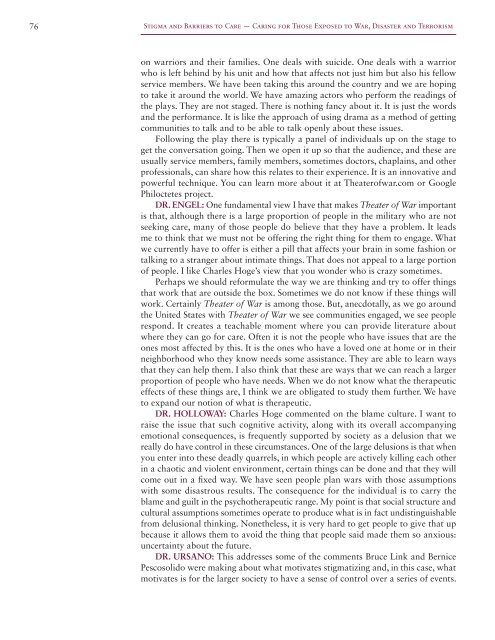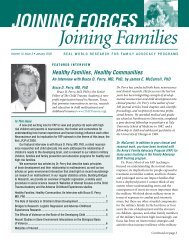stigma and barriers to care - Uniformed Services University of the ...
stigma and barriers to care - Uniformed Services University of the ...
stigma and barriers to care - Uniformed Services University of the ...
Create successful ePaper yourself
Turn your PDF publications into a flip-book with our unique Google optimized e-Paper software.
76<br />
Stigma <strong>and</strong> Barriers <strong>to</strong> Care — Caring for Those Exposed <strong>to</strong> War, Disaster <strong>and</strong> Terrorism<br />
on warriors <strong>and</strong> <strong>the</strong>ir families. One deals with suicide. One deals with a warrior<br />
who is left behind by his unit <strong>and</strong> how that affects not just him but also his fellow<br />
service members. We have been taking this around <strong>the</strong> country <strong>and</strong> we are hoping<br />
<strong>to</strong> take it around <strong>the</strong> world. We have amazing ac<strong>to</strong>rs who perform <strong>the</strong> readings <strong>of</strong><br />
<strong>the</strong> plays. They are not staged. There is nothing fancy about it. It is just <strong>the</strong> words<br />
<strong>and</strong> <strong>the</strong> performance. It is like <strong>the</strong> approach <strong>of</strong> using drama as a method <strong>of</strong> getting<br />
communities <strong>to</strong> talk <strong>and</strong> <strong>to</strong> be able <strong>to</strong> talk openly about <strong>the</strong>se issues.<br />
Following <strong>the</strong> play <strong>the</strong>re is typically a panel <strong>of</strong> individuals up on <strong>the</strong> stage <strong>to</strong><br />
get <strong>the</strong> conversation going. Then we open it up so that <strong>the</strong> audience, <strong>and</strong> <strong>the</strong>se are<br />
usually service members, family members, sometimes doc<strong>to</strong>rs, chaplains, <strong>and</strong> o<strong>the</strong>r<br />
pr<strong>of</strong>essionals, can share how this relates <strong>to</strong> <strong>the</strong>ir experience. It is an innovative <strong>and</strong><br />
powerful technique. You can learn more about it at Theater<strong>of</strong>war.com or Google<br />
Philoctetes project.<br />
DR. ENGEL: One fundamental view I have that makes Theater <strong>of</strong> War important<br />
is that, although <strong>the</strong>re is a large proportion <strong>of</strong> people in <strong>the</strong> military who are not<br />
seeking <strong>care</strong>, many <strong>of</strong> those people do believe that <strong>the</strong>y have a problem. It leads<br />
me <strong>to</strong> think that we must not be <strong>of</strong>fering <strong>the</strong> right thing for <strong>the</strong>m <strong>to</strong> engage. What<br />
we currently have <strong>to</strong> <strong>of</strong>fer is ei<strong>the</strong>r a pill that affects your brain in some fashion or<br />
talking <strong>to</strong> a stranger about intimate things. That does not appeal <strong>to</strong> a large portion<br />
<strong>of</strong> people. I like Charles Hoge’s view that you wonder who is crazy sometimes.<br />
Perhaps we should reformulate <strong>the</strong> way we are thinking <strong>and</strong> try <strong>to</strong> <strong>of</strong>fer things<br />
that work that are outside <strong>the</strong> box. Sometimes we do not know if <strong>the</strong>se things will<br />
work. Certainly Theater <strong>of</strong> War is among those. But, anecdotally, as we go around<br />
<strong>the</strong> United States with Theater <strong>of</strong> War we see communities engaged, we see people<br />
respond. It creates a teachable moment where you can provide literature about<br />
where <strong>the</strong>y can go for <strong>care</strong>. Often it is not <strong>the</strong> people who have issues that are <strong>the</strong><br />
ones most affected by this. It is <strong>the</strong> ones who have a loved one at home or in <strong>the</strong>ir<br />
neighborhood who <strong>the</strong>y know needs some assistance. They are able <strong>to</strong> learn ways<br />
that <strong>the</strong>y can help <strong>the</strong>m. I also think that <strong>the</strong>se are ways that we can reach a larger<br />
proportion <strong>of</strong> people who have needs. When we do not know what <strong>the</strong> <strong>the</strong>rapeutic<br />
effects <strong>of</strong> <strong>the</strong>se things are, I think we are obligated <strong>to</strong> study <strong>the</strong>m fur<strong>the</strong>r. We have<br />
<strong>to</strong> exp<strong>and</strong> our notion <strong>of</strong> what is <strong>the</strong>rapeutic.<br />
DR. HOLLOWAY: Charles Hoge commented on <strong>the</strong> blame culture. I want <strong>to</strong><br />
raise <strong>the</strong> issue that such cognitive activity, along with its overall accompanying<br />
emotional consequences, is frequently supported by society as a delusion that we<br />
really do have control in <strong>the</strong>se circumstances. One <strong>of</strong> <strong>the</strong> large delusions is that when<br />
you enter in<strong>to</strong> <strong>the</strong>se deadly quarrels, in which people are actively killing each o<strong>the</strong>r<br />
in a chaotic <strong>and</strong> violent environment, certain things can be done <strong>and</strong> that <strong>the</strong>y will<br />
come out in a fixed way. We have seen people plan wars with those assumptions<br />
with some disastrous results. The consequence for <strong>the</strong> individual is <strong>to</strong> carry <strong>the</strong><br />
blame <strong>and</strong> guilt in <strong>the</strong> psycho<strong>the</strong>rapeutic range. My point is that social structure <strong>and</strong><br />
cultural assumptions sometimes operate <strong>to</strong> produce what is in fact undistinguishable<br />
from delusional thinking. None<strong>the</strong>less, it is very hard <strong>to</strong> get people <strong>to</strong> give that up<br />
because it allows <strong>the</strong>m <strong>to</strong> avoid <strong>the</strong> thing that people said made <strong>the</strong>m so anxious:<br />
uncertainty about <strong>the</strong> future.<br />
DR. URSANO: This addresses some <strong>of</strong> <strong>the</strong> comments Bruce Link <strong>and</strong> Bernice<br />
Pescosolido were making about what motivates <strong>stigma</strong>tizing <strong>and</strong>, in this case, what<br />
motivates is for <strong>the</strong> larger society <strong>to</strong> have a sense <strong>of</strong> control over a series <strong>of</strong> events.




